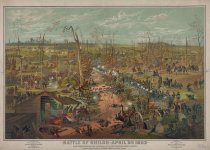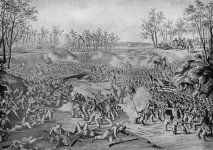jazzeum
Four Star General
- Joined
- Apr 23, 2005
- Messages
- 38,889
Today is the 150th anniversary of the Battle of Shiloh, which is the subject of today's post in the Times' Disunion Series, Why Shiloh Matters.

Battle of Shiloh, April 6, 1862
The author of the piece, Winston Groom, writes:
"What followed were two of the bloodiest days of the Civil War, leaving 24,000 men on both sides dead, dying and wounded.
When it was over the nation — two nations as it were, for the moment — convulsed, horrified, at the results. A great battle had indeed been anticipated; at stake was control of the Mississippi River Valley, which would likely decide who won the war. But the Battle of Shiloh was not the outcome that anyone wanted.
Beyond the grisly statistics, Americans north and south of the Mason-Dixon line were suddenly confronted with the sobering fact that Shiloh hadn’t been the decisive battle-to-end-all-battles; there was no crushing victory — only death and carnage on a scale previously unimaginable. The casualty figures at Shiloh were five times greater than its only major predecessor engagement, the Battle of Bull Run, and people were left with the shocking apprehension that more, and perhaps many more, such confrontations were in store before the thing was settled."
The author concludes
"A very real and important result of the battle was that after Shiloh Grant reached the stark conclusion that the only way to restore the Union would be the total conquest — or in his words, “subjugation” — of the South. Sherman had understood this long before Shiloh and began to indulge his soon-to-be well-known pyromaniacal urges along the Mississippi River near Memphis.
But the overarching significance of Shiloh was to impress on everyone that there was never going to be one neat, brilliant, military maneuver that would end the war — or even come close to winning it. It was as if Shiloh had unleashed some tremendous, murderous thing that was going to “drench the country in blood,” as Sherman had prophesied on the eve of secession."

A Battle near Pittsburg Landing in Tennessee
Professor Brooks Simpson also takes a look at Shiloh in his Crossroads blog, Triumph Over Adversity: U.S. Grant at Shiloh

Battle of Shiloh, April 6, 1862
The author of the piece, Winston Groom, writes:
"What followed were two of the bloodiest days of the Civil War, leaving 24,000 men on both sides dead, dying and wounded.
When it was over the nation — two nations as it were, for the moment — convulsed, horrified, at the results. A great battle had indeed been anticipated; at stake was control of the Mississippi River Valley, which would likely decide who won the war. But the Battle of Shiloh was not the outcome that anyone wanted.
Beyond the grisly statistics, Americans north and south of the Mason-Dixon line were suddenly confronted with the sobering fact that Shiloh hadn’t been the decisive battle-to-end-all-battles; there was no crushing victory — only death and carnage on a scale previously unimaginable. The casualty figures at Shiloh were five times greater than its only major predecessor engagement, the Battle of Bull Run, and people were left with the shocking apprehension that more, and perhaps many more, such confrontations were in store before the thing was settled."
The author concludes
"A very real and important result of the battle was that after Shiloh Grant reached the stark conclusion that the only way to restore the Union would be the total conquest — or in his words, “subjugation” — of the South. Sherman had understood this long before Shiloh and began to indulge his soon-to-be well-known pyromaniacal urges along the Mississippi River near Memphis.
But the overarching significance of Shiloh was to impress on everyone that there was never going to be one neat, brilliant, military maneuver that would end the war — or even come close to winning it. It was as if Shiloh had unleashed some tremendous, murderous thing that was going to “drench the country in blood,” as Sherman had prophesied on the eve of secession."

A Battle near Pittsburg Landing in Tennessee
Professor Brooks Simpson also takes a look at Shiloh in his Crossroads blog, Triumph Over Adversity: U.S. Grant at Shiloh

